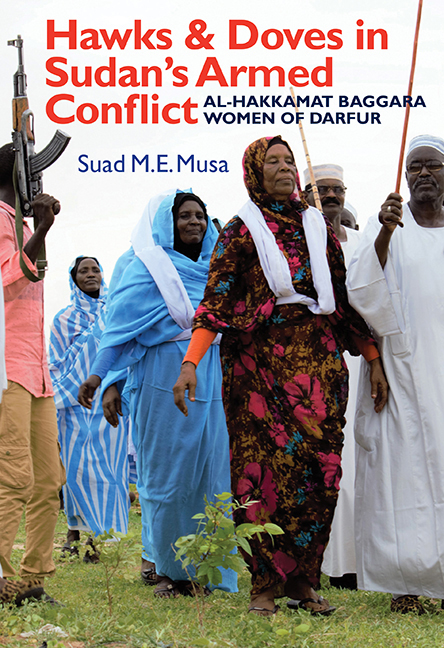Book contents
- Frontmatter
- Dedication
- Contents
- List of Illustrations
- Acknowledgements
- Glossary
- Abbreviations
- Note on Transliteration
- Introduction: Conflict in Darfur and the Role of Rural Darfuri Women
- 1 Ethnicity and Administration in Darfur
- 2 Conflict in Darfur: Causes and Implications
- 3 Al-Hakkamat Women
- 4 Local Inter-ethnic Conflicts
- 5 Government and Racial Assimilation of Ethnic Groups
- 6 Liaising with Government
- 7 New Duties and Obligations
- 8 Roles in Peace and Reconciliation
- 9 Urban Identity and Social Change
- 10 Conclusion
- Appendix: Darfur Chronology, 1445–2017
- Bibliography
- Index
- Eastern African Studies
4 - Local Inter-ethnic Conflicts
Published online by Cambridge University Press: 12 October 2019
- Frontmatter
- Dedication
- Contents
- List of Illustrations
- Acknowledgements
- Glossary
- Abbreviations
- Note on Transliteration
- Introduction: Conflict in Darfur and the Role of Rural Darfuri Women
- 1 Ethnicity and Administration in Darfur
- 2 Conflict in Darfur: Causes and Implications
- 3 Al-Hakkamat Women
- 4 Local Inter-ethnic Conflicts
- 5 Government and Racial Assimilation of Ethnic Groups
- 6 Liaising with Government
- 7 New Duties and Obligations
- 8 Roles in Peace and Reconciliation
- 9 Urban Identity and Social Change
- 10 Conclusion
- Appendix: Darfur Chronology, 1445–2017
- Bibliography
- Index
- Eastern African Studies
Summary
It has been established already that al-Hakkamat have significant power and agency, which they use to influence the social and political conduct of men, despite being excluded from the decision-making frameworks and initiatives within their tribes. Their influence, more often than not, has surfaced quite intensely as they have turned simple disputes among tribes and ethnic groups into events with disastrous outcomes. Since the 1970s, their destructive influence has featured quite remarkably in most of the conflicts experienced in Darfur. This is certainly not accidental, or a revelation of merely personal interests and attitudes. Indeed, it is the result of an authentic adherence to the ethical responsibilities and obligations towards the defence ideals of the tribe and the Ageed organisation. In the following pages, we explore the relationship between al-Hakkamat and the Ageed, and how it has unfolded in the context of conflict in Darfur since the 1970s.
AGEED MILITARY ORGANISATION
The complexity of nomadic life has compelled the Baggara communities in Darfur, since time immemorial, to frame their own arrangements in order to be able to protect their communities and herds from various adversaries. These arrangements have taken the form of a military organisation that has progressively acquired substantial importance, especially with the recent deterioration of social and economic resources and the mounting insecurity in Darfur, not least the absence of reliable governance to maintain law and order. This organisation operates quite independently of the native administration: the authority that should be responsible for administering people's affairs within the tribes’ land boundaries. This military organisation is called the Ageed.
The Ageed (sing. Ageed; pl. Augada) organisation usually consists of a group of Augada and horsemen (combatants on horses). Each Ageed represents a clan and he often commands about one hundred horsemen. The size of the Augada therefore depends on the number of clans (khashum bait) affiliated to the tribe. The tribal supreme military chief referred to as Ageed al-Shoosha, also called Ageed al-Augada, is just like a commander general in modern armies, and commands a group of Augada. The Augada constitute the military council of the Ageed organisation, whereas select horsemen would up make the executive body. It is a framework for unity and solidarity that responds to calls for help, especially in times of extreme need.
- Type
- Chapter
- Information
- Hawks and Doves in Sudan's Armed ConflictAl-Hakkamat Baggara Women of Darfur, pp. 68 - 95Publisher: Boydell & BrewerPrint publication year: 2018

